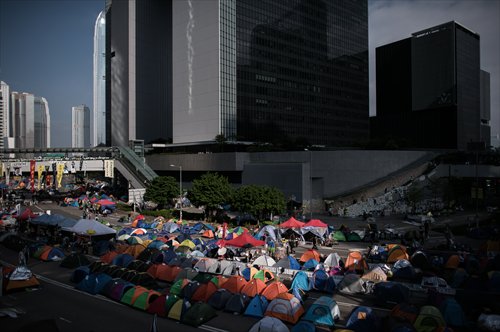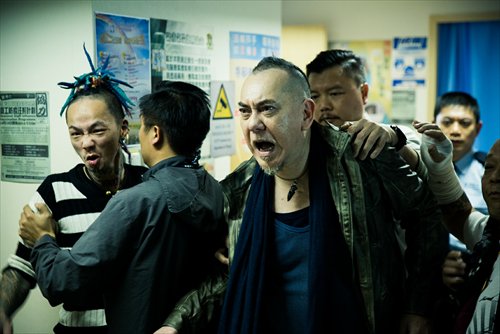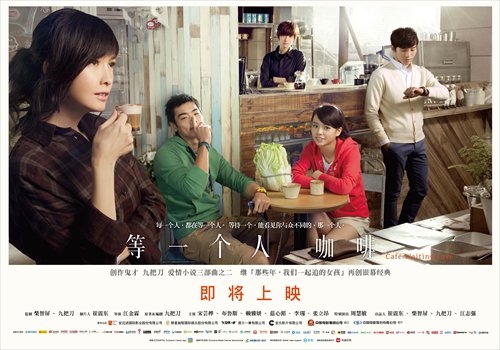Celebrities risk reputations, earnings speaking out on political issues
Hong Kong and Taiwan celebrities who openly support the Occupy Central movement are facing condemnation from China's State media and boycotts in the blogosphere. Experts and industry insiders say that given China's political environment, celebrities have to take caution when expressing their political views to avoid risking their careers.

Tents of protesters are seen on an occupied highway in Hong Kong on October 28. Photo: AFP
This year has been unlucky for film producer Xi Jianhong. The head of Huaren Hongcheng Film Production Company said that his is among the show business companies that have been hardest hit by the recent crackdown on tainted or problematic celebrities. "We're one of the victims," he told the Global Times.
Xi said that earlier this year his company was planning a film entitled The Graduate. Giddens Ko was set to direct, with Kai Ko as the movie's leading man. The two Taiwanese filmmakers' 2011 work, You Are the Apple of My Eye, was a critical and commercial success, making them two of the most sought-after entertainers in China.
But the two Ko's flourishing careers might have been forever altered by two major scandals earlier this year. Kai Ko was arrested on drug charges this August with Jaycee Chan, son of Jackie Chan, amid a crackdown on artists and entertainers who use drugs and frequent prostitutes. At a recent forum, officials from the State Administration of Press, Publication, Radio, Film and Television (SARFT), China's media watchdog, said these tainted artists will be banned from television and film screens.
The controversy surrounding writer and director Giddens Ko were of another sort. Ko openly supports Taiwan's Sunflower Student Movement, an anti-reunification movement which protested against the Cross-Strait Service Trade Agreement with the Chinese mainland this March and April. This month, he expressed his support for Hong Kong's Occupy Central Movement on his Sina Weibo. His vocal political views have been blasted by mainland netizens, with many calling him a separatist.
While rumors have been circulating online that his books will be removed from bookstores as the result of an official ban, reports showed that they were still being sold. His new film, Cafe Waiting Love, which premiered on October 17, however, suffered from an online boycott. Three days after the film's premiere, it had only generated 6.84 million yuan ($1.1 million) in box office in the mainland, as opposed to over 30 million yuan in box office one week after the premiere of his first movie You Are the Apple of My Eye.
These changes forced Xi to reconsider his company's new production. "We had to postpone this project, and change the major cast and crew," Xi said.

A scene of Anthony Wong Chau-Sang from the movie Hidden Dragon. Photo: CFP
Condemnation and boycott
Giddens Ko is not the only celebrity likely to suffer a financial hit from a publicity crisis in the mainland. In Hong Kong, many celebrities, including singers, actors and directors who participated in the Occupy Central movement have been condemned by State media and boycotted by netizens.
A recent commentary published by the Xinhua News Agency condemned actors Chapman To and Anthony Wong Chau-Sang and singer Denise Ho for their support for Occupy Central, saying they are harming Hong Kong's society.
But netizens' fury can sometimes be as harmful to the celebrities' careers as an official ban. Many celebrities, once they are targeted as "unpatriotic" by netizens , often see their personal social media pages flooded with thousands of angry comments and vulgarities, in a form of verbal violence.
Online sentiment can also influence the market for a celebrity' works. The marketing teams for the film Aberdeen, for example, deleted the name and image of Chapman To from its marketing materials this May, after the actor was boycotted by mainland netizens. The film was still a commercial failure, a fact which some netizens regarded as a victory.
The sentiment was the strongest on China's blogosphere. On Sina Weibo, over 45,000 tweets were posted under the tag "pro-Occupy Central celebrities, please get out of the mainland." The tag was first created by an Internet denizen called Haishireping on October 21 and soon became the hottest topic of the day.
Author Lu Tianming wrote on his Sina Weibo, "Some celebrities, especially those from Hong Kong and Taiwan, on the one hand openly support independence movements in Hong Kong or Taiwan and engage in separatist activities. On the other hand, they rely heavily on China's mainland as their source of income. Shouldn't the SARFT ban them temporarily as well?"
In response to the call for a ban, Anthony Wong Chau-Sang said on his Facebook page that he will shoot more Hong Kong films, even though it means taking a pay cut.
Feng Jun, an analyst with Ent Group, a consulting firm for the entertainment industry, said that politics is a sensitive topic in the entertainment industry. "Celebrities live on their work and on public opinion toward them. Their reputation is their 'second life.' To protect their reputation celebrities should avoid scandals or political leanings," she told the Global Times.

A poster of Giddens Ko's film Cafe Waiting Love. Photo: CFP
Probable bans
Willy Lam, an expert on Chinese politics at the Chinese University of Hong Kong, told the Global Times, "There is no official censorship in Hong Kong and Taiwan, so writers and artists can pursue any topics as long as they do not break the law."
Even so, celebrities taking political stances risk losing the mainland market. Last November, Taiwanese singer Deserts Zhang displayed a Taiwanese flag during a concert at the University of Manchester. The issue flared up online, with netizens calling her action a declaration of Taiwan's independence. Following the incident, Zhang had to cancel a concert scheduled for that December in Beijing.
Other celebrities were banned from television shows following their political expressions. Annie Yi, an outspoken Taiwanese actress, was banned from a number of mainland television channels following remarks on Sina Weibo about press freedom last year.
When asked if he thinks these pro-Occupy Central celebrities will be officially banned from China's mainland, Bo Zhiyue, a senior research fellow at the East Asian Institute of the National University of Singapore, said, "I hope they won't be punished. This is a test for the government that they don't punish people for their political views."
Xi, the producer, said the SARFT's crackdown on tainted artists and the State media's ideological criticism of artists have been a reminder that companies should be cautious when they cast actors, so as to avoid potential risks.
"Some Taiwanese producers used to caution me about the political stands Giddens Ko takes. I didn't take them seriously. Now it seems like I was wrong," he said.
"Many production companies have signed agreements with actors, saying that if an actor has personal problems causing their work to be banned, he or she will have legal responsibility [for the losses incurred]," he said.
Minimizing controversies
Mainland celebrities, however, have been rather quiet on the movement that has divided Hong Kong's entertainment industry. Actress Yao Chen, Sina Weibo's most followed celebrity, is one of the few who expressed her view on the movement, albeit indirectly. In a post on September 30, she retweeted one of her 2012 posts in which she talked about her affection for Hong Kong, with a comment that no one could possibly fault: "Love Hong Kong. Hope it could soon return to its past prosperity and peace."
Hu Xingdou, a commentator and professor at the Beijing Institute of Technology, said that it is usually unwise for celebrities in the Chinese mainland to publicly talk politics. "Celebrities or businessmen are suggested to avoid political topics so as not to risk their career or business," Hu told the Global Times.
"It's worth pointing out that [as a result of] China's political environment, most celebrities do not understand politics. Their political views are often naive," Hu said.
Most mainland celebrities have managed to minimize controversy by steering clear of openly discussing political topics. The few incidents related to politics have often resulted from ignorance. In 2001, actress Zhao Wei was caught in a publicity crisis after a magazine photo of her posing in a dress printed with a "rising sun" Japanese flag (considered a symbol of Japanese militarism) triggered a backlash among patriotic fans. After some critics urged a boycott of her albums, television and films, Zhao was forced to write a letter expressing her regret and apologizing for her ignorance of history.
"Generally speaking, politics is a taboo in the entertainment industry. However, under certain circumstances, it can help boost public opinion of a celebrity if he or she picks the right topic and express his views with discretion," one agent for several celebrities, who asked not to be named, told the Global Times.
Chinese President Xi Jinping recently told artists in a forum that artists "should not fall slave to money" but should offer "spiritual guidance to reinforce people's moral judgment and sense of honor."
Newspaper headline: Walking the tightrope